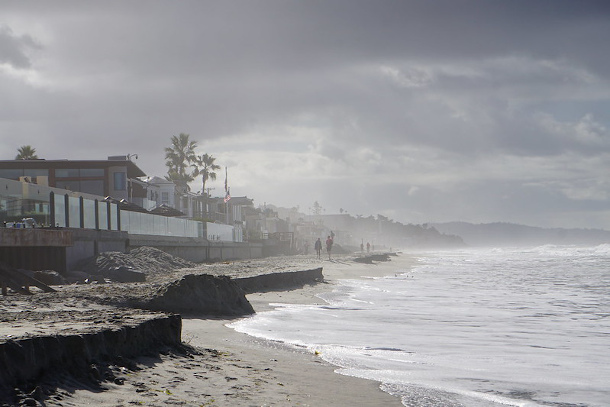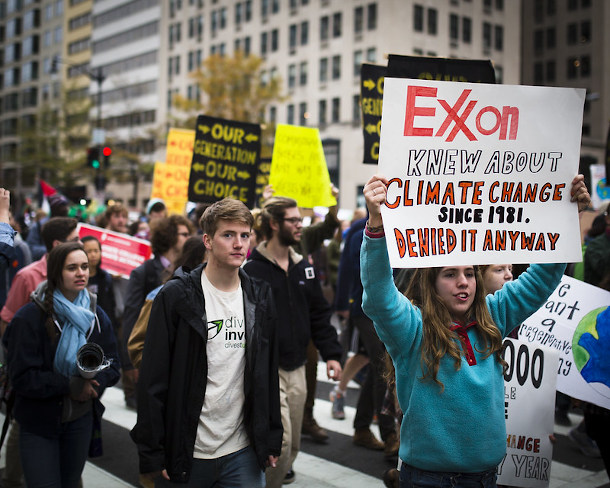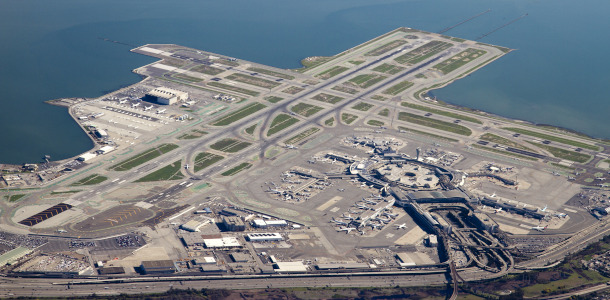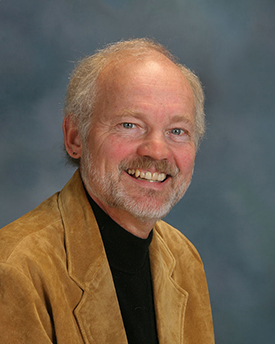Climate Liability Cases Seek Big Damages from Big Oil
Air Date: Week of June 12, 2020

Sea level rise is threatening homes, businesses and infrastructure along California’s coast. (Photo: Emmett Institute, Flickr CC BY-NC 2.0)
Several California counties and cities are suing some 30 energy companies to seek compensation for the steep costs of building seawalls, relocating communities, and other sea level rise consequences of climate disruption. Now the litigation is one step closer to trial, as a federal appeals court has decided that the cases belong in California state court, where the plaintiffs have a better chance than in federal court. Vermont Law School Professor Pat Parenteau joins Host Steve Curwood to explain the stakes.
Transcript
Back in 2017 some California counties and cities took 30 oil companies to court to seek compensation for loss and damage related to climate disruption. The suits claimed the companies, including Exxon, BP, Chevron and Shell knew the widespread use of their products would upset the climate balance and deliberately put Californians at risk of sea level rise and wildfires, and lied to the public about it. Billions of dollars are at stake in these cases. The oil companies wanted the cases tried in federal court, but now the U.S. Circuit Court of Appeals for the Ninth District has sent the litigation to California state courts, where if the cases are proven, state law allows juries to make major awards for damage. But wait. There are similar cases in other jurisdictions so before it is all over the US Supreme Court may get involved. Here to explain is Vermont Law School Professor Pat Parenteau. Pat, welcome back to Living on Earth!
PARENTEAU: Thanks, Steve. Very good to be with you.
CURWOOD: And just to be clear, on the record, you've given some pro bono advice to some of these plaintiffs here.
PARENTEAU: That's correct. Pro bono, for free.
CURWOOD: What exactly is the argument that the California cities and counties are making? Why do they say that these fossil fuel companies should be on the hook for paying for some of the costs of dealing with climate impacts?
PARENTEAU: Right, and the impacts they're talking about are real. They're focused on the coastal zone of California. They're focused on sea level rise, storm surge, flooding, coastal erosion. They have the science behind them to say that what's happening to California's coast is the result of climate change and carbon pollution of the atmosphere. And they're saying that these defendants are the major contributors to the atmospheric pollution that's causing this damage, and the counties and cities are having to expend significant amounts of money to try to armor plate the coastline against these changes, or to move facilities out of the danger zones, the high hazard zones, all of which costs lots of money, causes lots of disruption. And they're saying all of this lies at the feet of the oil industry, because they knew this was coming. They knew it was going to be significant. They didn't warn anybody about it. They tried to cover it up; many times, they were successful in covering it up. Had they not done that, steps could have been taken long ago to either address the emissions that are causing this problem, or at least get started on adaptation planning. That's the nature of the damages they're seeking; they're actual costs, they're not hypothetical numbers. And also the conduct of the defendants, which is now almost a matter of public record. There's been so many of the documents now have come to light that prove what the companies knew and how they dealt with the knowledge. So it's a really classic tort case, where it's the conduct of the defendants that's the real issue as much as anything.

A protester carries a sign calling out fossil fuel giant Exxon for quietly studying climate change decades ago, while downplaying the risks publicly. (Photo: Johnny Silvercloud, Flickr CC BY-SA 2.0)
CURWOOD: In other words, the oil companies knew about the problems of greenhouse gases, and yet did not take action and in fact, misled the public? How important is that to the case?
PARENTEAU: I think that's very important. It is an act of misleading and lying, not to put too fine a point on it, about what you did know, and what you did about it. And there's a very strong line of cases in California, some of the precedents deal with lead paint, for example. California sued the paint manufacturer Sherwin-Williams and others and said, you actually knew that lead paint was going to create hazards as the paint weathered, and as it came off the walls inside of homes or on the outside of homes, and as children began playing in these areas, and ingesting this lead, and doing serious damage to their brains. This was all information you had, decades ago, and you, you hid it from the public. And you told mothers to paint their nurseries because lead was durable, and it was easy to clean. Instead of saying, you know what, at some point this lead is going to get out of the paint and onto the floor and expose your kids to it, and that's going to be dangerous. They didn't do that. So California won a huge damage award against the paint manufacturers, over a billion dollars to go in and de-lead these various residences that have a high level of, of leaded paint in them. So that's a key precedent, actually, for these climate cases, because it's the same kind of behavior of companies selling a product, knowing it's dangerous, and not disclosing that.
CURWOOD: Pat. Let's say that, for whatever reason, you decided to represent the oil companies. What would you be most worried about in these cases, if you were representing them?

The runways of San Francisco Airport are just 10 feet above current sea level. (Photo: Nathan Rupert, Flickr CC BY-NC-ND 2.0)
PARENTEAU: The first thing I'm going to be worried about is the discovery process in these cases, which is open now, the plaintiffs can proceed to call some of these corporate executives and put them under oath in a deposition and start asking them very specific questions and showing them documents and saying, "As far back as the 1960s, even, you began studying these problems, and you knew, right?" And so you're going to ask these people questions about what they knew, when they knew it, what they did with it, why they didn't disclose it. Did they fund active anti-legislative movements to prevent Congress from adopting, for example, the Waxman-Markey law, which would have created a cap and trade program for dealing with carbon emissions decades ago? And they're gonna have to answer those questions, the same way that tobacco executives ultimately had to answer questions or face even more serious repercussions from perjury. So that's one thing that the industry is very afraid of, is actually having on the record to admit what they've done. The other thing is, the reason the states want to be in state court, is because they rightly think they're going to have a more sympathetic jury pool to draw from. State court juries are different than the way federal juries are composed. It does give the states an upper hand. And of course, in the end, it's what the jury decides that matters. So that's what the industry is worried about: case gets to a jury after this lengthy discovery, in which all of their, chicanery, if you will, has been revealed, and they're looking at some huge verdicts.

Former EPA Regional Counsel Pat Parenteau teaches environmental law at Vermont Law School (Photo: Courtesy of Vermont Law School)
CURWOOD: Hmm. So if these counties and towns should prevail, how much money do you think that the fossil fuel companies could be on the hook for?
PARENTEAU: Well, it's billions, that's for sure. You have to start thinking about the damage that's already been done to the California coast, and what's coming. For example, San Francisco is seriously contemplating having to move the airport. Anybody who's flown into San Francisco knows where that airport is. And if you look at the models of sea level rise that are affecting the California coast, that's a very, very difficult location to maintain an airport. I mean, the kind of sea walls that you would have to build to protect it are, you know, phenomenally expensive. So that's the kind of thing where the amount of damages are going to be very hard to quantify and estimate. And it may be that some of these cases don't result in a one-time damage award, they may be ongoing. And obviously, the extent to which we get a handle on some of these emissions and begin to really bring them down to the point where some of these worst case impacts aren't realized, that's going to be all the more important. That's another role for these court decisions, obviously, is to push the politics of climate hard, and to push the industry hard. And it's also going to be reflected in the financial markets, which are becoming more and more nervous about investments in all of this fossil fuel infrastructure, and extraction of all these sources of oil and gas all over the world. And we're seeing, you know, brokers like BlackRock pulling away from fossil investment, JP Morgan, issuing warnings to some of their companies that they loan money to, that's one of the biggest financiers of fossil fuel development in the world. You're really seeing movements in everywhere except the United States Congress, frankly, on this issue. And these cases are propelling that.
CURWOOD: Pat Parenteau is a Professor of environmental law at the Vermont Law School. Pat, thanks so much for taking the time with us again.
PARENTEAU: My pleasure, Steve, thank you.
Links
Living on Earth wants to hear from you!
Living on Earth
62 Calef Highway, Suite 212
Lee, NH 03861
Telephone: 617-287-4121
E-mail: comments@loe.org
Newsletter [Click here]
Donate to Living on Earth!
Living on Earth is an independent media program and relies entirely on contributions from listeners and institutions supporting public service. Please donate now to preserve an independent environmental voice.
NewsletterLiving on Earth offers a weekly delivery of the show's rundown to your mailbox. Sign up for our newsletter today!
 Sailors For The Sea: Be the change you want to sea.
Sailors For The Sea: Be the change you want to sea.
 The Grantham Foundation for the Protection of the Environment: Committed to protecting and improving the health of the global environment.
The Grantham Foundation for the Protection of the Environment: Committed to protecting and improving the health of the global environment.
 Contribute to Living on Earth and receive, as our gift to you, an archival print of one of Mark Seth Lender's extraordinary wildlife photographs. Follow the link to see Mark's current collection of photographs.
Contribute to Living on Earth and receive, as our gift to you, an archival print of one of Mark Seth Lender's extraordinary wildlife photographs. Follow the link to see Mark's current collection of photographs.
 Buy a signed copy of Mark Seth Lender's book Smeagull the Seagull & support Living on Earth
Buy a signed copy of Mark Seth Lender's book Smeagull the Seagull & support Living on Earth

